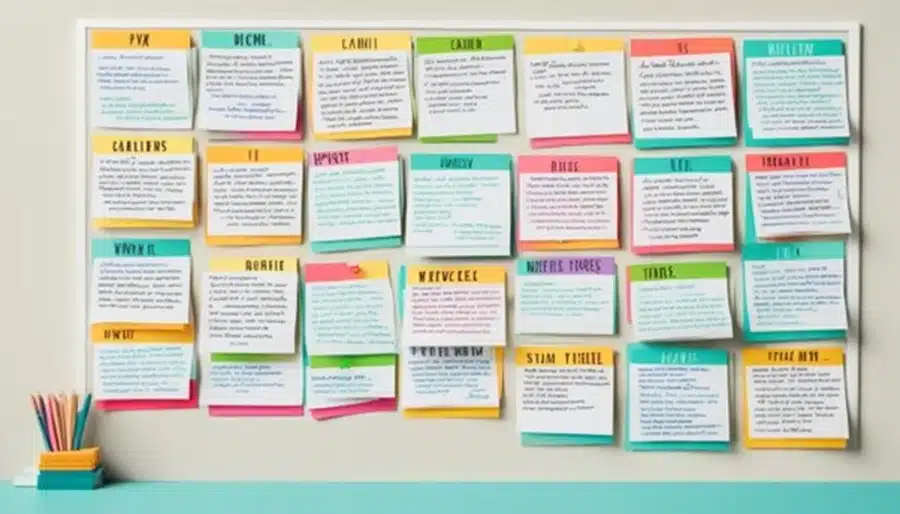Freelance writing offers a flexible and rewarding career, allowing you to work from home (or anywhere) and choose projects that excite you. In today’s digital age, the demand for skilled writers is higher than ever, as businesses need content for websites, blogs, and social media.
This growing market makes freelancing a viable and attractive career option. If you’re new to this field and unsure where to start, this article will guide you through the essential steps to begin your freelance writing journey.
From polishing your skills to finding your first clients, we’ll cover everything you need to know to kickstart your career.
Key Takeaways
- Learn different types of writing and popular niches.
- Master grammar and style, use resources, and practice daily.
- Create diverse samples through guest blogs, personal blogs, and case studies.
- Create a website, use social media, and post on Medium to build a portfolio.
- Pitch to businesses by sending emails, set rates, and manage time and finances.
Step 1: Understand the Freelance Writing Landscape
To start a career in freelance writing, it’s important to understand the various aspects of the industry. This includes the different types of writing you can do, the popular niches and their market demand, and the benefits and challenges you might face.
Different Types of Freelance Writing
Freelance writing comprises a variety of writing styles and purposes. Here are some common types of freelance writing roles you can start with:
| Different Types of Freelance Writing | |||||
| Blog Posts | Writing articles for blogs to inform or entertain readers. | ||||
| Copywriting | Creating persuasive content for ads, websites, and emails to promote products or services. | ||||
| Technical Writing | Developing manuals, guides, and documentation for technical products. | ||||
| Ghostwriting | Writing content that is credited to someone else. | ||||
| Content Writing | Producing informative articles and lists for various websites. | ||||
| Creative Writing | Crafting stories, scripts, and other imaginative works. | ||||
| SEO Writing | Writing content optimized for search engines to improve website rankings. | ||||
Popular Niches and Their Market Demand
Certain niches in freelance writing are particularly in demand. Knowing these can help you focus your efforts on areas with high market demand:
| Popular Niches | |
| Technology | High demand for writers who understand tech trends and products. |
| Health and Wellness | Articles on fitness, nutrition, and mental health are very popular. |
| Finance | Personal finance, investing, and economic trends are sought-after topics. |
| Travel | Content about destinations, travel tips, and experiences is always needed. |
| Marketing | Writing about digital marketing strategies, social media, and branding. |
| Education | Content for online courses, e-learning platforms, and educational blogs is in demand. |
Benefits and Challenges of Being a Freelance Writer
Freelance writing offers many advantages but also comes with its own set of challenges. Here’s what to expect from freelancing or work from home jobs:
| Benefits | Challenges |
| -You can set your own schedule and work from anywhere. -You get to work on different projects across various industries. -You are your own boss and can choose your clients. | -Work can be inconsistent which may lead to fluctuating income. -Building a client base takes time and hard work. -Balancing multiple projects and deadlines can be challenging. |
Understanding these elements will help you navigate the freelance writing landscape more effectively.

Step 2: Develop Your Writing Skills
To succeed as a freelance writer, you need to constantly improve your writing skills. This means mastering grammar and style, using available resources to learn, and practicing regularly. Good writing is built on a foundation of strong grammar and a clear style. Here’s why it’s important:
- Professionalism: Proper grammar makes your writing look professional and credible.
- Clarity: Clear writing helps readers understand your message easily.
- Trust: Clients trust writers who can deliver error-free and polished content.
Resources for Improving Writing Skills
There are many resources available to help you improve your writing. Here are some useful options:
Books: Reading books can provide valuable insights and tips. Try reading “The Elements of Style” by Strunk and White or “On Writing Well” by William Zinsser for helpful tips.
Online Courses: Many platforms like Coursera, Udemy, and Skillshare offer courses to help you learn and practice writing.
Writing Workshops: Joining workshops can give you feedback from other writers and instructors. Enquire at your local community centers or try online writing groups to improve your writing skills.
Write Daily: Writing every day helps you develop a regular writing habit. Regular practice sharpens your writing skills and helps you find your voice. Writing daily keeps your creativity flowing and generates new ideas.
By focusing on these areas, you can develop the skills needed to become a successful freelance writer.
Step 3: Build A Strong Portfolio
A strong portfolio is key for new freelancers as it shows your writing skills and reflects your subject matter expertise. Having a diverse and professional portfolio will enable new clients to understand your ability to write different types of content.
Moreover, it builds trust as professional samples make you look credible and competent. If you don’t have clients yet, you can create writing samples in several ways. Guest blogging for other blogs allows you to get published work and gain exposure.
Starting a personal blog is another great option to showcase your writing style and expertise. You can also write and post on Medium to build a professional portfolio as a new freelancer. This can help you find freelance content writing projects.
Step 4: Set Up Your Online Presence
New freelancers need a strong online presence to attract clients. Start by creating a professional website and blog to showcase your work, share your expertise, and improve your online visibility. Use platforms like WordPress or Wix for easy setup.
Utilize social media to promote your work and connect with potential clients. Share your articles, engage in relevant groups, and network with industry professionals on platforms like Twitter, Facebook, and Instagram.
Not to mention, LinkedIn is crucial for networking and finding freelance opportunities. Create a detailed profile, join industry groups, and connect with potential clients and other writers to expand your network and find job leads.


